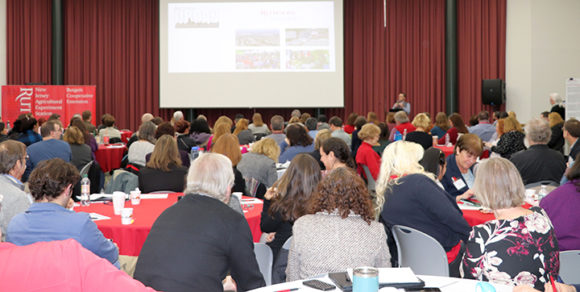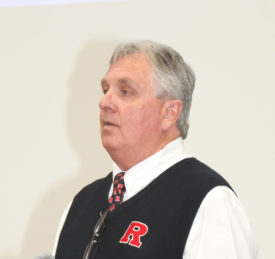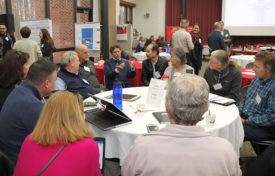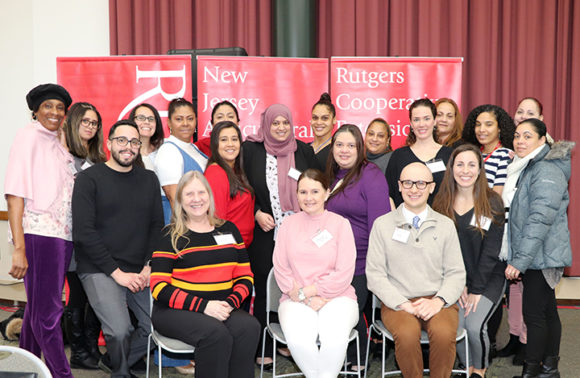On January 13, Rutgers Cooperative Extension (RCE) faculty and staff from around the state gathered on the Cook Campus in New Brunswick for the 2020 Annual Conference.
The meeting started off with ice breaker exercises – a warm-up familiar to participants in 4-H – led by Sharon Kinsey, 4-H agent II, Cooperative Extension of Camden County and Michelle Teitsma, 4-H program associate, Cooperative Extension of Warren County.
Rutgers Cooperative Extension director Brian Schilling hosted the conference, which had an underlying theme of “telling our story better” – a message Schilling has been emphasizing for an organization often dubbed “New Jersey’s best kept secret.”
The guest speaker was Rutgers provost and executive vice chancellor for research and academic affairs, Prabhas Moghe. As the chief research officer, Provost Moghe hosts the Office of Research and Innovation which fosters a collaborative culture of ideation, inquiry, and knowledge creation at the university. As the campus-wide inaugural Vice Chancellor for Research and Innovation, Moghe is familiar with academic and research initiatives on the Rutgers–New Brunswick campus and has worked to cultivate collaborative networks across the university and peer institutions that will allow Rutgers to gain further ground as a premier land-grant research university. Moghe has established a network of research deans and development directors to advance the research enterprise in a wide spectrum of areas, including environmental and biological sciences, among many others.
Moghe is enthusiastic about his mission, noting that New Jersey has the highest number of Ph.D.’s per square mile, and with the collaborative nature of Rutgers, combined with that “Jersey attitude” (i.e. telling it like it is), therein lies the great potential for these innovations. He continued that the story that’s yet to be told, and doing a better job of telling it, will enable us to grow our capacity for more research funding.
Moghe encourages bringing together different groups for brainstorming sessions and invites extension specialists to work with him to explore topics in such a manner.
Schilling noted that while RCE hasn’t had an annual conference in a few years, one of extension’s greatest strengths is the 350 faculty and staff on campus, in the county offices, and off-campus centers, and this event is an important venue to get to know each other.
“We are the gateway to communities to the resources of Rutgers University,” said Schilling. He acknowledged NJAES executive director and dean Bob Goodman’s support and challenge to realize this opportunity. Schilling shared a passage from Cooperative Extension Services and the 21st Century Land-Grant Mission by Gordon Gee, et al: “Universities that are not engaged with their communities in the 21st century will soon find themselves disengaged from any meaningful relevance to the citizens of the U.S.”
“We need to tell our stories better,” said Schilling. “We do great work and have to work a little harder to make programming more visible and assessable.” Schilling emphasized that extension personnel are ambassadors of the Rutgers NJAES brand, and to be effective, staff needs to know what others in extension are doing, which can be assisted by the SEBS/NJAES Office of Communications & Marketing.
For a look ahead for 2020, Schilling noted substantial changes are coming, with the retirement of Rutgers president Barchi, in addition to Goodman and NJAES research director Brad Hillman stepping down from their roles at the end of the fiscal year. The upcoming year will also bring more faculty and staff retirements and new hires.
Office of Communications & Marketing (OCM) director Mike Green spoke on “Telling our story and why it matters.” Green shared that while extension personnel communicate from their individual perspective, it is important to recognize that “Rutgers is our brand,” and the value that brings. He reminded the group of the need to align program success to funding success by reinforcing our funding source, the Rutgers New Jersey Agricultural Experiment Station–which is separate from the Rutgers University budget.
Green also emphasized that due to short attention spans and media competition, we only have 30 seconds to capture an audiences’ attention. Most do not read the text, requiring more visual story telling. “Less is better” in telling the story, and using images and short taglines work best. Green stressed that it is a two-way street between OCM and the counties and off-campus centers and OCM is there to help.
Associate director Richard Alomar introduced the Office of Urban Extension and Engagement (OUEE), which started in July, 2019 and is administrated by Alomar and Angela Johnson, project coordinator. Alomar said that Rutgers has been on the forefront nationally of urban extension, citing groundwork done by Mary Jane Willis and Chris Obropta. OUEE, which is the successor to Office of Agriculture and Urban Programs, has a work plan for the next two years, involving adapting some RCE programs to the needs of urban areas, and for those needs outside extension’s area, interfacing with other organizations, or other units of Rutgers that do similar work. A national conference for the National Urban Extension Leaders will be hosted by Rutgers and held in Atlantic City in May of 2021. The OUEE website has recently been launched and social media presence.
Roundtable discussions followed the speakers, with topics covering online learning; understanding the world of short courses; volunteer management; food waste; industrial hemp; wildlife management; and healthy dining.
A presentation of awards for excellent work by faculty, staff, students, and volunteers was made by extension director Brian Schilling, associate director of administration and personnel Kathleen Howell, and administrative coordinator Rhonda Breen-Simone. The awards and recipients are posted here.
Following lunch, NJAES executive director Bob Goodman spoke, announcing that the end of this fiscal year will be the conclusion of his 15 years as dean and director, as he will be stepping down from his role and joining the ranks of faculty. Goodman encouraged participants to continue to reach out to the needs of stakeholders, while being mindful of the tools available – electronic, teleconferencing, social media and storytelling. “Look for every opportunity to amplify our message with stakeholders,” said Goodman.
Afternoon breakout sessions focused on topics for improving work efficiency and management.
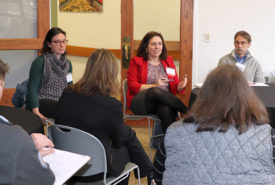
4-H department chair Rachel Lyons (center) led a roundtable on volunteer management as well as discussions on storytelling.
The conference concluded with 4-H department chair Rachel Lyons talking about the RCE Communicators Fellowship Program which she co-chaired with STEM 4-H agent Janice McDonnell. The program, “Story Telling: Tapping the Power of Narrative,” was led by Andy Goodman of The Goodman Center, which teaches communications and marketing professionals how to reach more people with more impact. Two of the Communicators Fellows, Lindley G. Cook 4-H Camp director Ben Clawson, and Office of Continuing Professional Education marketing program coordinator Casey Sky Noon read the stories they composed for the program. These will be available as upcoming posts on NJAES Newsroom.
Lyons challenged RCE personnel to think about stories to tell and encouraged practicing storytelling, sharing on social media, and supporting colleagues in telling RCE’s stories. The Extension Stories series will be launched on NJAES Newsroom in February.
A poster session also accompanied the conference, with 32 posters on display from various departments of Cooperative Extension and Rutgers School of Environmental and Biological Sciences.

